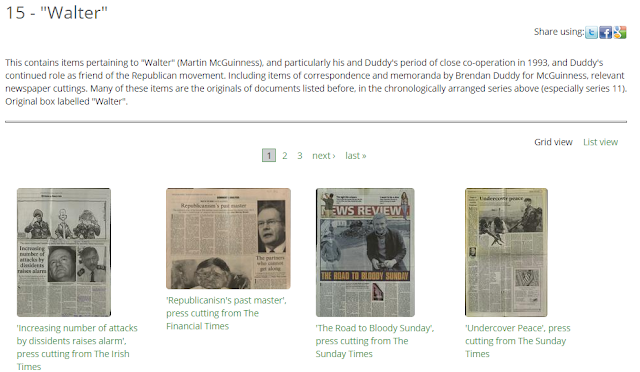Martin McGuinness - In Conflict and Peace: From the Archives
The recent stepping away from active political life by Martin McGuinness and from his role as Deputy First Minister, signalled a polemic shift in the political landscape in Northern Ireland, His passing today, aged 66, has further intensified the consideration of his life and role in Northern Ireland, and his journey from conflict to peace, over many decades.
The perhaps unknown role that Martin McGuinness played, over many years, in negotiating a peaceful and sustained end to conflict in Northern Ireland can be seen within the archive of mediator Brendan Duddy. Brendan Duddy was born in Derry on 10 June 1936. He became a businessman in his native city, and by the early 1970s he owned and managed two fish-and-chip shops, one in Beechwood Avenue (Creggan) and another in William Street. Duddy knew Martin McGuinness in the 1960s when McGuinness worked for a supplier company delivering burgers to Duddy's shops - at a time when McGuinness's interest in politics was not yet kindled.
At the time it would have been impossible for anyone to predict the central roles both men would play over the course of the following decades.
One section of the Duddy papers pertain to a figure known as ‘Walter'. These items, now digitised and available from the Hardiman Library, reveal the extent of efforts by "Walter" - the active code-name for Martin McGuinness - and particularly his and Duddy's period of close co-operation in 1993. The files include detailed draft and final correspondence and memoranda sent by Brendan Duddy to McGuinness, which show the level of tense and prolonged discussions regarding the Peace Process of the early 1990s and the later Good Friday Agreement of 1998. The files also include other items such as relevant newspaper cuttings focusing on McGuinness.
Examples include a dossier of three letters from Brendan Duddy to Martin McGuinness, previously sent 21 March - 19 June 1999, copied by telefax to an unidentified recipient in September 1999, detailing the central role and importance played by McGuinness in peace talks. As key mediator in this long process, Duddy, here codenamed as “June”, writes to McGuinness, stating “The War is indeed over and I sincerely hope you can deliver the peace.”. Further letters from Duddy to McGuiness discuss the problematic process of decommissioning of weapons and as recent as June 2006, a letter from Brendan urges McGuinness to “keep driving the Peace Process forward as you have been doing over the last twenty years.” (pol35_585)
The Duddy archive offers an indispensable account of understanding and of previously unknown information about the arduous and lengthy and also at times unsuccessful attempts at stabilising peace in Norther Ireland over nearly forty years. The role of Martin McGuinness in this process can be understood in a broader capacity as this archive is digitally available:
https://digital.library.nuigalway.ie/islandora/object/nuigalway%3Aduddy
The perhaps unknown role that Martin McGuinness played, over many years, in negotiating a peaceful and sustained end to conflict in Northern Ireland can be seen within the archive of mediator Brendan Duddy. Brendan Duddy was born in Derry on 10 June 1936. He became a businessman in his native city, and by the early 1970s he owned and managed two fish-and-chip shops, one in Beechwood Avenue (Creggan) and another in William Street. Duddy knew Martin McGuinness in the 1960s when McGuinness worked for a supplier company delivering burgers to Duddy's shops - at a time when McGuinness's interest in politics was not yet kindled.
 |
| Screenshot of "Walter" material, Duddy Digital Archive, NUI Galway |
At the time it would have been impossible for anyone to predict the central roles both men would play over the course of the following decades.
One section of the Duddy papers pertain to a figure known as ‘Walter'. These items, now digitised and available from the Hardiman Library, reveal the extent of efforts by "Walter" - the active code-name for Martin McGuinness - and particularly his and Duddy's period of close co-operation in 1993. The files include detailed draft and final correspondence and memoranda sent by Brendan Duddy to McGuinness, which show the level of tense and prolonged discussions regarding the Peace Process of the early 1990s and the later Good Friday Agreement of 1998. The files also include other items such as relevant newspaper cuttings focusing on McGuinness.
 |
| Telex from Duddy to McGuinness, 1999 |
Examples include a dossier of three letters from Brendan Duddy to Martin McGuinness, previously sent 21 March - 19 June 1999, copied by telefax to an unidentified recipient in September 1999, detailing the central role and importance played by McGuinness in peace talks. As key mediator in this long process, Duddy, here codenamed as “June”, writes to McGuinness, stating “The War is indeed over and I sincerely hope you can deliver the peace.”. Further letters from Duddy to McGuiness discuss the problematic process of decommissioning of weapons and as recent as June 2006, a letter from Brendan urges McGuinness to “keep driving the Peace Process forward as you have been doing over the last twenty years.” (pol35_585)
 |
| Typescript of letter from Duddy to McGuiness, 1999 |
The Duddy archive offers an indispensable account of understanding and of previously unknown information about the arduous and lengthy and also at times unsuccessful attempts at stabilising peace in Norther Ireland over nearly forty years. The role of Martin McGuinness in this process can be understood in a broader capacity as this archive is digitally available:
https://digital.library.nuigalway.ie/islandora/object/nuigalway%3Aduddy
Comments